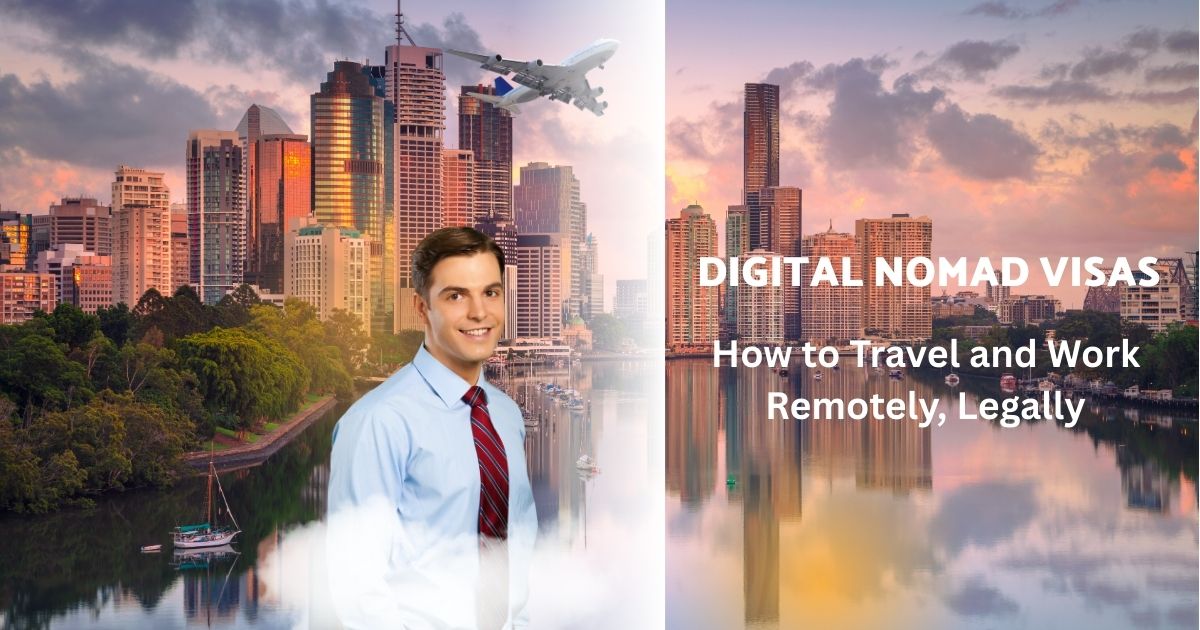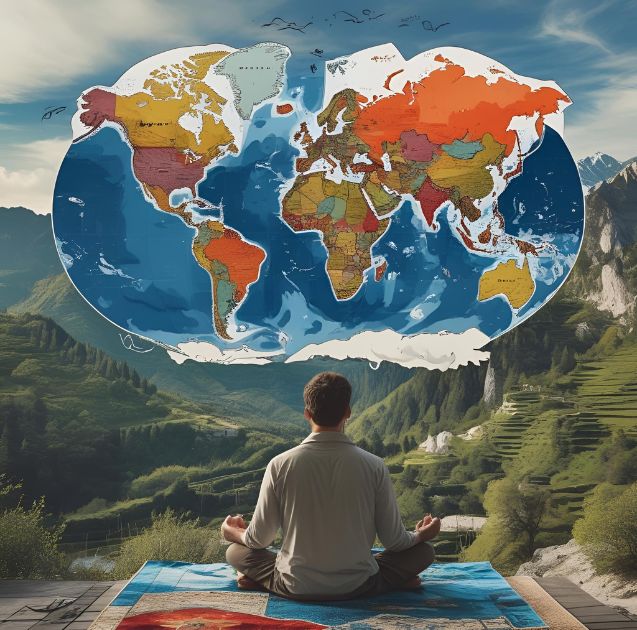
The Digital Nomad Dream: More Than Just a Mindset

The dream is intoxicating: swapping your office cubicle for a beachfront café in Bali, your commute for a morning stroll through historic Lisbon, and your rigid 9-to-5 for a flexible schedule that accommodates both deadlines and discovery. The rise of remote work has transformed this fantasy into a tangible reality for millions. But as the digital nomad movement matures, a critical question emerges from the legal gray area: How do you do it legally?
For years, nomads hopped from country to country on tourist visas, living in the shadows and hoping authorities wouldn’t ask too many questions about the work they were doing on their laptops. This method, often involving “visa runs” to neighboring countries to reset the clock, is fraught with risk, stress, and uncertainty. Thankfully, governments worldwide are catching up. They recognize the economic benefits these location-independent professionals bring and are rolling out a new class of permit designed specifically for them: the digital nomad visa.
This guide is your passport to understanding this new frontier of travel and work. We’ll demystify what a digital nomad visa is, explore the top countries offering them, and provide a comprehensive checklist to prepare you for your application. It’s time to turn your dream of working from anywhere into a sustainable, legal, and stress-free lifestyle.
What Exactly Is a Digital Nomad Visa?
A digital nomad visa is an official, government-issued authorization that allows you to reside in a foreign country for an extended period (typically one to two years, often renewable) while working remotely for employers or clients outside of that country.
It’s crucial to understand how it differs from other visa types:
- Tourist Visa: This is for leisure and tourism only. Working on a tourist visa, even for a foreign company, is technically illegal in most countries. It can lead to fines, deportation, and a ban on re-entry.
- Work Permit/Visa: This is for individuals who have a job offer from a company within the host country. It ties you to a local employer and involves a much more complex application process, often requiring the employer to prove no local candidate could fill the role.
The digital nomad visa bridges this gap perfectly. It acknowledges that you are not taking a local job but are contributing to the local economy through your spending on accommodation, food, and services, all while earning foreign income.
Top Countries Offering Digital Nomad Visas: Your Global Office Awaits
The list of countries offering these visas is growing every month. Here’s a detailed look at some of the most popular and accessible options currently available.
1. Portugal: The European Darling
Portugal has long been a favorite for nomads, and its official D8 Visa (also known as the Digital Nomad Visa) has solidified its top-tier status. With its stunning coastline, historic cities, fantastic food, and affordable cost of living, it’s easy to see the appeal.
Key Details & Requirements:
- Visa Length: The initial visa allows for a stay of up to one year, which can then be converted into a two-year residence permit, renewable thereafter.
- Income Threshold: You must prove a monthly income of at least four times the Portuguese minimum wage. As of early 2024, this is approximately €3,280 per month.
- Proof of Work: Contracts, client letters, or proof of business ownership for freelancers.
- Other Requirements: Proof of accommodation in Portugal (at least a short-term lease), a clean criminal record, and private health insurance.
Why It’s a Great Nomad Hub:
Thriving expat communities in Lisbon and Porto, excellent co-working spaces, reliable high-speed internet, and easy travel access to the rest of Europe. The visa also serves as a potential pathway to permanent residency and even EU citizenship over time.
2. Estonia: The E-Residency Pioneer
Estonia, a digitally advanced nation in Northern Europe, was one of the first to embrace the remote work revolution. It built upon its famous e-Residency program to launch one of the world’s first dedicated Digital Nomad Visas.
Key Details & Requirements:
- Visa Length: Up to one year (Type D visa).
- Income Threshold: You must have earned a minimum of €4,500 per month (before tax) in the six months preceding your application.
- Proof of Work: You must prove you can perform your work duties remotely, typically through employment contracts or evidence of your own registered foreign company.
- Other Requirements: Health insurance coverage for Estonia, a clean criminal record.
Why It’s a Great Nomad Hub:
Estonia is a modern, tech-savvy society with incredible digital infrastructure. It offers a unique blend of medieval history in Tallinn and pristine nature. It’s also part of the Schengen Area, allowing for easy travel across 27 European countries.
3. Costa Rica: Pura Vida for Remote Workers

If your ideal office is surrounded by lush rainforests and volcanic landscapes, Costa Rica’s “Rentista” and the newer, specific Digital Nomad Visa might be for you. The country’s “Pura Vida” (pure life) motto extends to its welcoming attitude towards foreigners.
Key Details & Requirements:
- Visa Length: One year, renewable for a second year.
- Income Threshold: A stable monthly income of at least $3,000 USD for an individual, or $4,000 USD for a couple/family.
- Major Perks: Holders of this visa are exempt from local income tax. You can also import personal equipment (like computers) and one vehicle tax-free.
- Other Requirements: Comprehensive medical insurance for the duration of your stay.
Why It’s a Great Nomad Hub:
Unparalleled biodiversity, a focus on eco-tourism and sustainability, a stable democracy, and a friendly local population. It’s perfect for nature lovers, surfers, and anyone seeking a healthier work-life balance.
4. Croatia: Mediterranean Living on the Adriatic
With its jaw-dropping coastline, thousands of islands, and historic walled cities (hello, Game of Thrones fans), Croatia offers a stunning Mediterranean lifestyle without the high price tag of Italy or France.
Key Details & Requirements:
- Visa Length: Up to one year. Note that you cannot reapply immediately after it expires; you must wait six months.
- Income Threshold: Approximately €2,539.31 per month. This can also be met by showing you have €30,471.72 in savings for the year.
- Tax Benefit: Digital nomads in Croatia are not subject to Croatian income tax.
- Other Requirements: Proof of remote work, health insurance, a rental agreement in Croatia, and a background check from your home country.
Why It’s a Great Nomad Hub:
Relatively low cost of living, incredible natural beauty, safe cities, and a growing nomad community, especially in Split and Zagreb. The food and wine scene is also a massive draw.
The Application Checklist: What You’ll Generally Need
While specifics vary by country, almost all digital nomad visa applications will require a core set of documents. Get these in order to streamline your process.
- Valid Passport: Usually needs to be valid for at least 6 months beyond your intended stay and have several blank pages.
- Proof of Income: This is the most critical part. Be prepared to provide 6-12 months of bank statements, employment contracts stating your salary and remote work status, letters from clients, or tax returns.
- Proof of Remote Work: A letter from your employer or, if you’re a freelancer, proof of business registration and client contracts.
- Comprehensive Health Insurance: A travel insurance policy that covers medical emergencies for the entire duration of your visa.
- Clean Criminal Record Check: An official document from your home country or country of residence, often requiring an apostille (a form of international certification).
- Application Form and Photos: The specific form from the country’s embassy or consulate, along with passport-sized photos meeting their specifications.
- Proof of Accommodation: Some countries require a 6- or 12-month lease agreement, while others accept a temporary hotel or Airbnb booking.
Navigating the Financials: Income Proof and the Tax Conundrum
Two of the biggest hurdles for applicants are proving sufficient income and understanding the tax implications. Let’s break them down.
Meeting the Income Threshold
Governments want to ensure you can support yourself without becoming a burden. Be meticulous here. If you are a freelancer with fluctuating income, it’s often best to show an average that is comfortably above the minimum threshold. Use a spreadsheet to track your monthly income for the required period and have bank statements ready to back it up. If you rely on a single employer, a clear contract and recent pay stubs are usually sufficient.
The Tax Conundrum
Disclaimer: I am not a tax professional. The following is for informational purposes only. Always consult with a qualified tax advisor who specializes in expat and digital nomad tax law.
Taxes are the most complex part of the digital nomad lifestyle. Your obligations can depend on:
- Your country of citizenship.
- The country you are residing in.
- How long you stay there (the “183-day rule” often makes you a tax resident).
- Tax treaties between the two countries.
Some digital nomad visas (like Croatia’s and Costa Rica’s) explicitly exempt you from local income tax on your foreign earnings. Others do not. In countries like Portugal, after a certain period, you will likely become a tax resident and be required to pay taxes there. It’s essential to understand your obligations in both your home country (especially if you are a U.S. citizen, as the U.S. taxes based on citizenship, not residency) and your host country. Professional advice is not just recommended; it’s essential to avoid costly mistakes.
Conclusion: Your Legal Path to a World of Opportunity
The digital nomad visa is more than just a piece of paper; it’s a key that unlocks the world, allowing you to live and work with peace of mind. It represents a fundamental shift in how we think about careers, travel, and global citizenship. The process requires preparation, diligence, and a significant amount of paperwork, but the reward is immense.
By choosing the legal path, you not only protect yourself but also contribute positively to the countries that welcome you. You become a part of the local fabric, spending your money, engaging with the culture, and supporting the very system that enables your dream. So, do your research, gather your documents, and take the leap. Your global office is waiting.










Leave a Reply